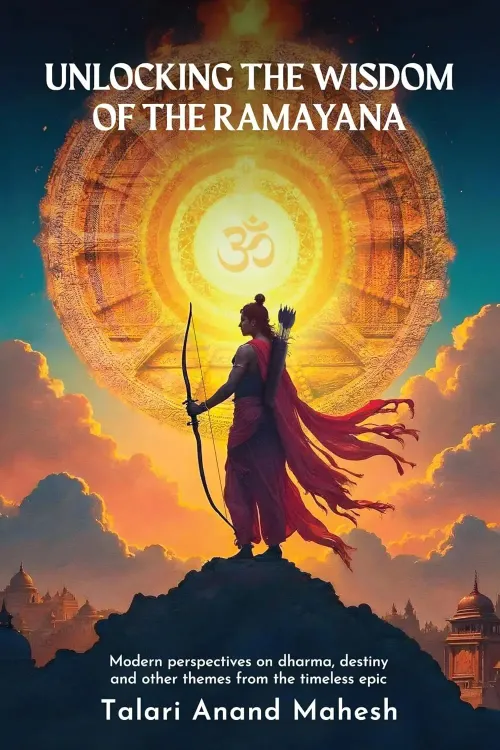What Life Lessons Can We Learn from the 'Ramayana'?

Synopsis
Key Takeaways
- The 'Ramayana' offers timeless lessons on ethics and morality.
- Valmiki's epic is rich in knowledge that transcends visual representations.
- Talari Anand Mahesh adapts the teachings for contemporary relevance.
- The book highlights the persistence of certain values through time.
- Readers are encouraged to reflect on their own lives through the lens of the epic.
New Delhi, Oct 1 (NationPress) Widely recognized as India's foremost religious epic, the Ramayana holds a significant place in the country's cultural and spiritual fabric. It is deeply ingrained in the collective consciousness of the people, especially through its varied representations in visual media and Ramlilas. However, its influence extends far beyond its principal themes of cosmic dualism, religious duty, and the Hindu creation narrative.
When examined with depth and understanding, Valmiki's masterpiece provides a plethora of life lessons that transcend mere ethics, morality, and fate. These insights emerge not only from the actions of its heroes but also from the complexities of its villains, ranging from the noble Prince of Ayodhya to the charioteer of his demonic foe.
Marketing strategist, storyteller, and passionate reader Talari Anand Mahesh aims to unveil these timeless lessons for contemporary readers in his book, ‘Unlocking the Wisdom of the Ramayana’ (One Point Six Technologies Pvt. Ltd/228 pp/Rs 455).
He emphasizes that while the triumph of good over evil is often seen as the epic's core message, there is a wealth of knowledge to be drawn from the text.
Mahesh believes that the epic is “rich in wisdom, far exceeding what any visual representation can convey,” as “every word, story, and subplot contains teachings that many miss due to the time constraints of reading our itihas or the limitations of visual storytelling.”
His goal is to distill the profound lessons of this esteemed epic into a format that appeals to a modern audience, highlighting the necessity for a renewed approach in sharing these teachings with today’s families and youth.
While he clarifies that he does not intend to provide a comprehensive retelling or a singular interpretation of the Ramayana, he focuses on extracting relevant lessons that can influence our personal and professional lives.
Additionally, Mahesh acknowledges that while his work is inspired by Valmiki’s text, especially the translation by the late Bibek Debroy, he has exercised “creative liberties,” modifying dialogues, passages, and situations for a more nuanced interpretation of the characters and story to enhance the relevance of the lessons.
Before delving into the lessons, he shares a captivating narrative of how Valmiki realized he was destined to compose this epic and provides a summary of its seven kandas, from “Bala Kanda” to “Uttara Kanda” (acknowledging that the latter is often viewed as a later addition).
In total, Mahesh presents around 40 lessons in this book. The final lesson synthesizes all the previous teachings, addressing themes like ideal living, ethics, justice, forgiveness, humility versus hubris, stress management, diplomacy, decision-making, duty versus luxury, loyalty, and various other aspects of the human experience.
‘Unlocking the Wisdom of the Ramayana’ is a praiseworthy endeavor that goes beyond the superficial aspects of an epic, offering insights into what it reveals about our own lives.
Crucially, it encourages readers to look beyond mere text and contemplate the persistence of certain issues and the enduring nature of specific values through time.









